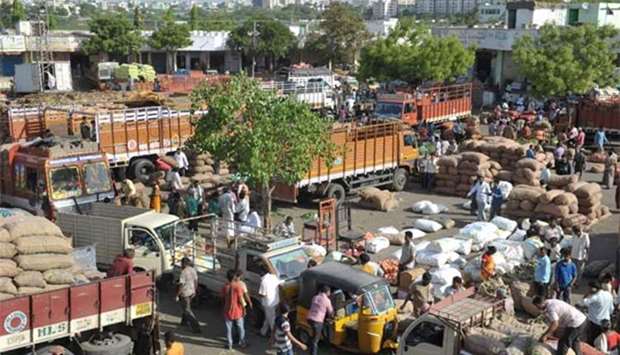India's growth slowed to 7.1% last year, according to official data released on Wednesday, weaker than analysts expected but still the fastest rate of growth of any major economy.
GDP growth for the 12 months ended March 31 was well below a revised figure of 8% for the previous year, and follows the government's shock move last November to ban most of the currency in circulation."This is a sharper deterioration than what I expected," Ashutosh Datar, economist at IIFL Institutional Equities, told AFP.
"The fourth quarter (6.1%) is a bit weaker than what I expected."
However the country of 1.25bn is still reporting faster growth than rival China, at 6.7% in 2016.
Prime Minister Narendra Modi has defended his move to remove all 500 (around $7.50) and 1,000 rupee notes from circulation as a necessary strike against corruption.
The government argues it will boost revenues by dissuading people from using cash, which makes it easier to avoid tax.
The move hit cash-dependent sectors like real estate, jewellery and agriculture, and triggered massive lines outside banks in the weeks afterwards as authorities struggled to print replacement notes fast enough.
India's chief statistician, however, rebuffed claims that the slowdown in growth was a result of the note ban.
"The argument that the number has turned out low or it is a consequences of the policy, those are statements I would be much more cautious about making," India's chief statician TCA Anant told reporters.
"The economy is growing reasonably well... these are relatively high growth rates," he added.
While the full impact of the note ban is still not known, analysts had expected a pick-up in the fourth quarter as consumers who had held back in the weeks after the cash ban stepped up spending.
"[The fourth quarter] clearly shows that demonetisation has had an impact on the overall growth for the economy," Sunil Sinha, principal economist at Fitch India told AFP.
"Now that cash is by and large back in place, that confidence is back with consumers that they no longer have to stand in queues and that cash will be available when they need it," he added.
In a report published earlier this week the World Bank said the fundamentals of India's economy remained strong and predicted an uptick in the economy with a national goods and services tax due to be introduced on July 1.
The move will likely "yield substantial growth dividends from higher efficiencies" and increase state revenues in the long term, the bank reported.
However, Aditi Nayar, principal analyst at ratings firm ICRA, predicted a "muted pick up in growth with GDP growth likely to increase by 10-20 basis points in FY 2017."

